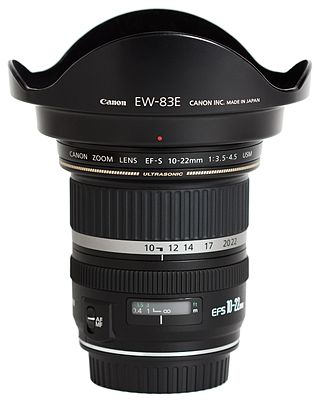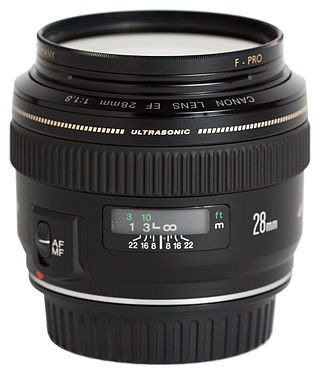
The EF lens mount is the standard lens mount on the Canon EOS family of SLR film and digital cameras. EF stands for "Electro-Focus": automatic focusing on EF lenses is handled by a dedicated electric motor built into the lens. Mechanically, it is a bayonet-style mount, and all communication between camera and lens takes place through electrical contacts; there are no mechanical levers or plungers. The mount was first introduced in 1987.

The Canon EF-S lens mount is a derivative of the EF lens mount created for a subset of Canon digital single-lens reflex cameras with APS-C sized image sensors. It was released in 2003. Cameras with the EF-S mount are backward compatible with the EF lenses and, as such, have a flange focal distance of 44.0 mm. Such cameras, however, have more clearance, allowing lens elements to be closer to the sensor than in the EF mount. Only Canon cameras released after 2003 with APS-C sized sensors support the EF-S mount.

The EF 70–200mm lenses are a group of telephoto zoom full-frame lenses made by Canon. The lenses have an EF mount to work with the EOS line of cameras.

The EF 1200 mm f/5.6 L USM is a super-telephoto prime lens that was made by Canon Inc. It uses an EF mount, and is compatible with the Canon EOS camera range. It has a focal length of 1200 mm and so on a digital body with a sensor size of 22.5 mm × 15 mm, such as a Canon EOS 40D or 450D, it provides a 35 mm field of view equivalent to that of a 1920 mm lens. With a body with a sensor size of 28.8 mm × 19.2 mm, such as a Canon EOS-1D Mark IV, the field of view is equivalent to that of a 1560 mm lens.

The EF 50mm lenses are a group of normal prime lenses made by Canon that share the same focal length. These lenses are based on the classic double-Gauss lens, with the f/1.8 being a standard six-element double-Gauss with an air gap and powers between element 2 and 3 and its faster cousins adding additional elements. The 50mm focal length, when used with a 35mm film or full-frame sensor, has been widely considered to match the perspective seen by the human eye.
The Canon EF 35mm lenses are a family of wide angle prime lenses with EF mount made by Canon Inc. The family also includes one EF-S lens that only mounts on Canon bodies with APS-C sensors.

The Canon EF-S 10–22mm f/3.5–4.5 USM lens is a wide to ultra-wide angle zoom lens for Canon digital single-lens reflex cameras with a Canon EF-S lens mount. The field of view has a 35 mm equivalent focal length of 16–35mm, which is analogous to the EF 16–35mm f/2.8L on a full-frame camera. The 10–22mm is an internal focusing lens. Of the 13 elements, one is of Canon's Super Ultra-Low Dispersion glass and three are aspherical elements.

The EF 85mm lenses are a group of medium telephoto prime lenses made by Canon Inc. that share the same focal length. These lenses have an EF type mount that fits the Canon EOS line of cameras.
The Canon EF 100 mm lenses are used for Canon DSLR cameras. There are four different types of EF 100 mm lens for Canon. Certain lenses are best for macro photos, whereas other lenses are good for taking pictures of subjects from a distance.

The EF 500mm lenses are a group of super-telephoto prime lenses made by Canon that share the same focal length.

The Canon EF 400mm are seven super-telephoto lenses made by Canon. These lenses have an EF mount that work with the EOS line of cameras. These lenses are widely used by sports and wildlife photographers.
The EF 200mm USM lens is an L-series prime telephoto lens made by Canon Inc. for the EOS line of cameras. Four 200 mm primes were made: f/1.8, two f/2.8, and the most recent f/2.0.
Canon Inc. has produced seven different 24mm lenses for its Canon EF and EF-S lens mounts. Three have been discontinued after updated replacements were announced.

The EF 28mm lenses are a group of prime lenses made by Canon that share the same focal length.

The Canon EF-S 60mm f/2.8 Macro USM lens is Canon's first EF-S macro lens, and also the company's first prime lens made specifically for the EF-S mount. Introduced in 2005, it was the only EF-S prime lens until the announcement of the EF-S 24mm f/2.8 STM in September 2014; a second EF-S macro lens, the EF-S 35mm f/2.8 Macro IS STM, was added to the lens lineup in April 2017. As an EF-S lens, it can only be used on cameras with a 1.6x crop factor and is the equivalent of a 96mm lens mounted on a 35mm format camera. As such this lens also can be a good choice for portrait photography.

The Canon EF 800mm f/5.6L IS USM lens is a super-telephoto lens by Canon Inc., released at a manufacturer's suggested retail price of US$11,999.00 and now selling at an MSRP of $12,999.00.

The EF 28–300mm f/3.5–5.6L IS USM lens is a superzoom lens made by Canon Inc.

The Canon EF-S 15–85mm f/3.5–5.6 IS USM is a standard zoom lens for Canon digital single-lens reflex cameras with an EF-S lens mount. The field of view has a 35 mm equivalent focal length of 24–136mm. The EF-S mount was specifically designed for APS-C cameras.

The EF 35–350mm f/3.5–5.6L USM lens is a discontinued telephoto zoom lens manufactured by Canon.

The Canon RF lens mount is an interchangeable-lens mount developed by Canon for its full-frame mirrorless interchangeable-lens cameras, and featured first by the EOS R, followed by the EOS RP. The RF mount was announced in September 2018. In May 2022, Canon announced APS-C EOS R cameras and RF-S lenses designed for these cameras.




















